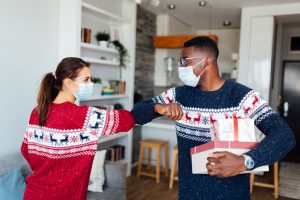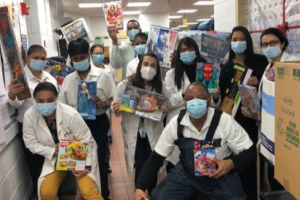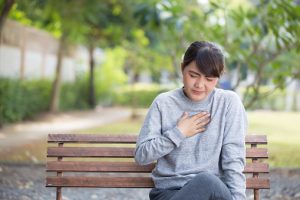The Centers for Disease Control and Prevention (CDC) recently issued guidelines for Americans to safely celebrate New Year’s Eve.
The CDC recommends postponing travel and celebrating at home with people you live with. You can always ring in the New Year virtually with friends and family. These are the best and safest ways to protect those living in your household and others.
If you are intending to travel or go out for New Year’s Eve events, the CDC cautions you to:
- If traveling – Research your chosen destination for cases of COVID- 19. You can utilize the CDC’s COVID Data Trackerto identify the latest number of cases in each area.
- Always wear a mask in public settings (restaurants, public transportation, when around people who don’t live with you)
- Wear your mask correctly – Over your nose and mouth, secured under your chin while snugly hugging your cheeks.
- Get your flu shot
- Stay at least 6 feet from people who do not live with you.
- Avoid crowds and poorly ventilated indoor spaces.
- Wash your hands often with soap and water for at least 20 seconds especially after you have been in a public place, after blowing your nose, coughing or sneezing and before eating
- Stay home if you are sick
- Isolate yourself from other members of your family and wear a mask if you are sick.
If you are hosting a celebration, the CDC recommends:
- Talk with guests ahead of time to set expectations for celebrating together.
- Limit the number of guests.
- Keep celebrations outdoors, if possible.
- If indoors, open windows and doors. Use a window fan to blow air out, which will pull fresh are in through the open windows.
- Clean and disinfect frequently touched surfaces and items between use
- Have guests bring their own food, drinks, plates, cups and utensils
- Have extra unused masks available for your guests and encourage everyone to wear them inside and outside.
- Keep background music volume low so guests don’t need to shout.
You also need to be mindful that, along with the new CDC guidelines, New Year’s Eve revelers are also urged to keep the traditional safety tips such as not drinking excessively or driving while intoxicated.
There is no doubt that 2020 has been an unusual year because of the COVID-19 pandemic. The virus has all but re-imagined how we celebrate our holidays. With the New Year approaching, we are all awaiting better days to come. Let’s celebrate, but let’s do it safely.
For more tips and guidelines visit – https://www.cdc.gov/coronavirus/2019-ncov/daily-life-coping/holidays/new-years-eve.html#:~:text=Stay%20at%20least%206%20feet,as%20masks%20and%20hand%20sanitizer.
All content of this newsletter is intended for general information purposes only and is not intended or implied to be a substitute for professional medical advice, diagnosis or treatment. Please consult a medical professional before adopting any of the suggestions on this page. You must never disregard professional medical advice or delay seeking medical treatment based upon any content of this newsletter. PROMPTLY CONSULT YOUR PHYSICIAN OR CALL 911 IF YOU BELIEVE YOU HAVE A MEDICAL EMERGENCY.










